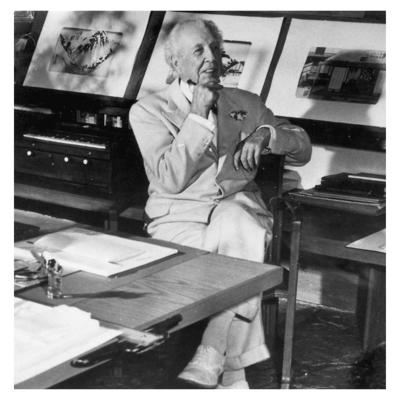We celebrated the 150th anniversary of Frank Lloyd Wright’s birth at Taliesin Saturday night, with an event that recalled the great dinners where America’s greatest architect brought together thinkers and doers in the last years of his remarkable life.
Born in 1867, Wright lived until 1959 — witnessing, and shaping, his country’s great transit from the Civil War era to the Space Age.
Wright is well recalled, and well regarded, for his contributions to our understanding of an organic architecture that can exist in harmony with nature. But he was, as well, a wise and worldly commentator on the political, economic and social debates of his day. This was especially true in the last years of his life, when Wright and his dear friend William T. Evjue, the founder and longtime editor of The Capital Times, did battle with the demagogues of their day.
So it was fitting that many of the discussions Saturday night turned to Donald Trump attacks on the free press as an “enemy of the people,” assaults on Thomas Jefferson’s “wall of separation between church and state,” rejection of facts and science, and disregard for the basic premises of American democracy. There were plenty of opinions at Taliesin on Trump and Trumpism, and on what Wright might have thought about the moment into which the country has descended.
Wright was surely an iconoclast, and he could be a bit of a contrarian.
But he had deeply held politically opinions, most of which extended from the Wisconsin progressive tradition of governor and U.S. Sen. Robert M. La Follette, his sons Sen. Robert M. La Follette Jr. and Gov. Phil La Follette, and the great southwestern Wisconsin progressive populist Gov. John Blaine.
The La Follette progressives and their political heirs disdained the demagogues of their era — foreign and domestic. And they were horrified at the rise of Wisconsin Sen. Joe McCarthy, the crudely fearmongering “red baiter” who used his position to practice a dishonest politics of personal destruction that came to be known as “McCarthyism.” A New Yorker column from last year observed, “The model for Donald Trump’s media relations is Joseph McCarthy,” and many historians have made the connection between McCarthyism and Trumpism.
While we do not know precisely what Wright would have thought of Trump, we do know exactly what the great architect thought of McCarthy. He regularly ripped into McCarthy the man and McCarthy the ism, warning of a threat that was “most dangerous to our democratic system.” The senator, he announced, was “a political pervert.”
In 1952, Evjue and The Capital Times crusaded against McCarthy’s re-election. The paper urged Republicans to reject the senator in the Sept. 9, 1952, Republican primary. When that didn’t work, the paper immediately began urging voters from all parties and political persuasions to support Democrat Tom Fairchild’s November challenge to McCarthy.
On Sept. 22, 1952, the paper’s front page featured a fiercely anti-McCarthy column by Wright: “Wake up, Wisconsin!”
“Fear is the real danger in any democracy. Our worst enemy now is this craven fear managed by conscienceless politicians,” wrote Wright.
The “democratic heart of the state” was being replaced by “demagoguery at the mobocratic level” — and by politicians who invented and inflated a supposed threat with their “lists” of supposed “reds” and “fellow travelers.” Wright portrayed McCarthy and his compatriots as political charlatans: “These fighters of communism! Do they really know what communism means? Ask them. Their answers will make you laugh. Do they know what democracy means? Ask them and weep.”
Recalling the days when La Follette and the progressives made Wisconsin America’s “laboratory of democracy,” Wright wrote, “Not so long ago, Wisconsin had the reputation as a great and noble state.” It had been “marked by great names of noble statesmen and famed as the home of great individuals.”
Writing just days after McCarthy’s Republican primary win had earned national headlines, Wright argued, “Today, by the popular electoral record, Wisconsin is a stench in the nostrils of decency everywhere.” The great name of Wisconsin had come, he wrote, “to stand more for damage to America (than that of) any other state.” He bemoaned the fact that the state of his birth was now understood as a haven for “inciters of a scared people.”
McCarthy needed to be voted out of office in order to remove the stench of demagoguery, to overcome the fear and division, and to renew democracy.
When the danger was removed, Wright wrote that “as an architect,” he was prepared “to submit a simple design for a suitable and perhaps salutary memorial for the chief demagogue.”
“Here it is: At all principal crossroads in the state set up, on a solid concrete base, a large caste-iron pot of simple but chaste design, say six feet in diameter. Pour into it a powerful charge of hydrogen sulfide or carbon dioxide. On the birthday of the chief demagogue,” Wright wrote, “over the entire area of the state light a blaze under every pot and raise such a prodigious stink that the true character of such a ‘patriot’ would be brought to the noses of the voters ... by their own nausea. This realistic celebration to continue for 24 hours or for long enough to bring to the voters realization of the character of such ‘patriotism.’”
That was classic Frank Lloyd Wright. He was a refined and dignified architect, to be sure. But he was, as well, a proud and passionate American who never hesitated to raise his voice against demagoguery and the tyranny that extends from it.
John Nichols is associate editor of The Capital Times. jnichols@madison.com and @NicholsUprising
Share your opinion on this topic by sending a letter to the editor to tctvoice@madison.com. Include your full name, hometown and phone number. Your name and town will be published. The phone number is for verification purposes only. Please keep your letter to 250 words or less.




